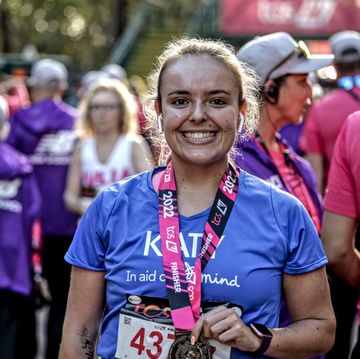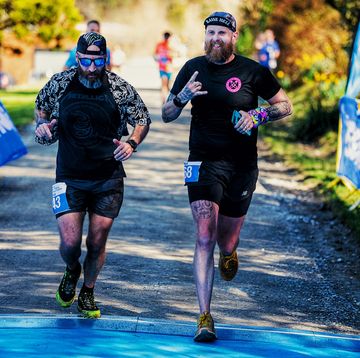Runners have long been aware of the mood-lifting benefits of a run, but the evidence is mounting that it can actually be just as effective for people with depression and/or anxiety disorders as medication. There is, however, a major proviso – and that's that it can be a lot harder to stick to as a treatment programme.
A team of researchers at Vrije University in Amsterdam conducted a study on 141 patients with symptoms of depression and anxiety – 58.2% were female, and the mean age of all the patients was 38.2 years. Out of the 141 patients, 45 received antidepressant medication, while 96 tried 'running therapy'.
The pharmaceutical intervention consisted of medication from the the commonly used class of drugs known as selective serotonin reuptake inhibitors, or SSRIs. Meanwhile the running group undertook two or three 'closely supervised' 45-minute group sessions per week over the 16-week period.
Both groups were monitored for their mental health – as well as physical health indicators, including heart rate variability, weight and lung function. After the 16 weeks were up, around 44% of people in both groups had shown improvements.
However, while 82% of the antidepressant group followed their treatment course correctly, only around 52% of the runners achieved the recommended amount of exercise, indicating that while running may be as effective as taking the SSRI drugs, it may be much harder for prospective patients to adhere to as a 'prescription'.
Professor Brenda Penninx, a psychiatry professor from Free University Amsterdam who was involved in the study, pointed out that, 'The study shows that lots of people like the idea of exercising, but it can be difficult to carry this through, even though the benefits are significant.'
It's also worth pointing out that the running involved was all in a group dynamic, not as solo efforts – though anecdotally, of course, many people may feel that running solo helps them to manage their own mental health.
The running group had, significantly, also improved other health markers – losing weight , lowering their blood pressure, and improving their heart function. Meanwhile the anti-depressant group actually showed a slightly downturn in their physical health.
This latest study adds to a growing body of evidence showing the mental health benefits of running. A 2020 meta-study (a study that analyses and combines the results of multiple other studies) found that 'acute bouts of running and longer-term running interventions are associated with improvements in a range of mental health outcomes'.
Other evidence has shown that exercise can also have a preventative effect: a 2018 study by the Institute of Psychiatry, Psychology and Neuroscience at King’s College looked at 260,000 people from around the world, and found that the most active were around 15% less likely to develop depression than the least active. And among those who carried out 150 minutes of moderate to vigorous activity a week, the risk of depression was reduced by around 30%.
NHS advice also notes that 'regular exercise may be a more effective treatment for mild depression than antidepressants', perhaps by boosting serotonin and dopamine levels in the brain. Exercising regularly can also boost self-esteem and confidence, which itself can help relieve symptoms of mild depression, too.
Anyone taking medication for depression should of course see their doctor before considering alternatives, and remember that anti-depressants are generally safe and effective for most people. Most studies that examine exercise vs medication also focus on people with mild to moderate depression.
'It is important to say that there is room for both therapies in care for depression,' explained Professor Penninx. 'We know that not treating depression at all leads to worse outcomes; so antidepressants are generally a good choice.'













